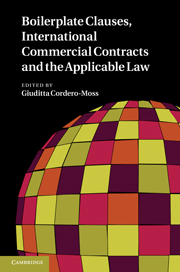Book contents
- Frontmatter
- Contents
- List of contributors
- Preface
- Introduction
- PART 1 How contracts are written in practice
- PART 2 Methodological challenges
- Introduction to Part 2
- 3 Does the use of common law contract models give rise to a tacit choice of law or to a harmonised, transnational interpretation?
- 4 Common law-based contracts under German law
- 5 Comparing exculpatory clauses under Anglo-American law: testing total legal convergence
- 6 Circulation of common law contract models in Europe: the impact of the European Union system
- PART 3 The applicable law's effects on boilerplate clauses
- Conclusion: the self-sufficient contract, uniformly interpreted on the basis of its own terms: an illusion, but not fully useless
- Bibliography
- Index
- References
4 - Common law-based contracts under German law
from PART 2 - Methodological challenges
Published online by Cambridge University Press: 11 April 2011
- Frontmatter
- Contents
- List of contributors
- Preface
- Introduction
- PART 1 How contracts are written in practice
- PART 2 Methodological challenges
- Introduction to Part 2
- 3 Does the use of common law contract models give rise to a tacit choice of law or to a harmonised, transnational interpretation?
- 4 Common law-based contracts under German law
- 5 Comparing exculpatory clauses under Anglo-American law: testing total legal convergence
- 6 Circulation of common law contract models in Europe: the impact of the European Union system
- PART 3 The applicable law's effects on boilerplate clauses
- Conclusion: the self-sufficient contract, uniformly interpreted on the basis of its own terms: an illusion, but not fully useless
- Bibliography
- Index
- References
Summary
Introduction
Courts must sometimes apply German law to a contract in spite of the fact that its terms are based on common law contract models. Problems may arise from such a mismatch between applicable law and contract terms. Their solutions straddle the borderline between substantive law, i.e., rules that tell us whether there is a contract and which rights and obligations arise under such a contract, and private international law, i.e., rules that tell us which country's law applies.
Normally, if a contract has been formulated with a particular contract law in mind (for example, English law), private international law rules will point to the application of that law. Within the EU, this question is governed by the Rome I Regulation, which provides:
Article 3 Freedom of choice
1. A contract shall be governed by the law chosen by the parties. The choice shall be made expressly or clearly demonstrated by the terms of the contract or the circumstances of the case. By their choice the parties can select the law applicable to the whole or to part only of the contract.
If parties have given any thought to the question of which law should be applicable, they will normally choose the same law that they have used as a model. If the contract contains no choice-of-law clause, obvious reliance on one particular legal system in the formulation of a contract can sometimes be seen as demonstrating a choice by the terms of the contract.
- Type
- Chapter
- Information
- Publisher: Cambridge University PressPrint publication year: 2011



